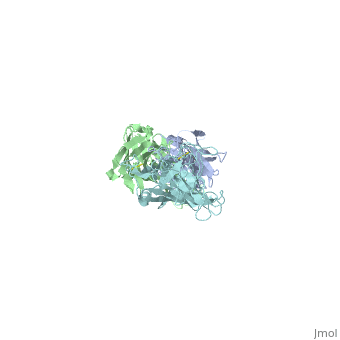G1SecL05: Difference between revisions
Moazzam Khan (talk | contribs) No edit summary |
mNo edit summary |
||
| Line 3: | Line 3: | ||
[[Image:1FJ1 Chain E.jpg|300px|right|thumb| 1FJ1 Chain E]] | [[Image:1FJ1 Chain E.jpg|300px|right|thumb| 1FJ1 Chain E]] | ||
= Table of Contents= | |||
'''1. Background ''' | |||
'''2. Introduction to the LA-2 fab complex and the recombinant ospA vaccine''' | |||
'''3. Binding affinitity and interactions in the LA-2 fab complex''' | |||
'''4. Structural Defects in the vaccine''' | |||
'''5. Discussion''' | |||
'''Background''' | |||
Background | |||
Lyme disease, discovered in 1975, is a vector- borne disease caused by the inoculation of spirochete borrelia into the skin by members of hard bodied ticks of the family Ixodidae. Symptoms include arthritis at major joints, neurological problems such as reduced memory and poor ability to concentrate, and characteristic lesions erythema migans, more commonly known as the bull’s eye rash. A major outer surface membrane protein of Borrelia, ospA, plays a key role in immunity against Lyme disease through its binding to the antibody LA-2 fab. | Lyme disease, discovered in 1975, is a vector- borne disease caused by the inoculation of spirochete borrelia into the skin by members of hard bodied ticks of the family Ixodidae. Symptoms include arthritis at major joints, neurological problems such as reduced memory and poor ability to concentrate, and characteristic lesions erythema migans, more commonly known as the bull’s eye rash. A major outer surface membrane protein of Borrelia, ospA, plays a key role in immunity against Lyme disease through its binding to the antibody LA-2 fab. | ||
Introduction to the LA-2 OspA | Introduction to the LA-2 OspA fab complex | ||
<Structure load='1fj1' size='500' frame='true' align='right' caption='Insert caption here' scene='Insert optional scene name here' /> | <Structure load='1fj1' size='500' frame='true' align='right' caption='Insert caption here' scene='Insert optional scene name here' /> | ||
Revision as of 04:53, 29 April 2013
LA-2 FAB with OspA ComplexLA-2 FAB with OspA Complex
Table of ContentsTable of Contents
1. Background 2. Introduction to the LA-2 fab complex and the recombinant ospA vaccine 3. Binding affinitity and interactions in the LA-2 fab complex 4. Structural Defects in the vaccine 5. Discussion
Background
Lyme disease, discovered in 1975, is a vector- borne disease caused by the inoculation of spirochete borrelia into the skin by members of hard bodied ticks of the family Ixodidae. Symptoms include arthritis at major joints, neurological problems such as reduced memory and poor ability to concentrate, and characteristic lesions erythema migans, more commonly known as the bull’s eye rash. A major outer surface membrane protein of Borrelia, ospA, plays a key role in immunity against Lyme disease through its binding to the antibody LA-2 fab.
Introduction to the LA-2 OspA fab complex
|
